|
|
|
Sort Order |
|
|
|
Items / Page
|
|
|
|
|
|
|
| Srl | Item |
| 1 |
ID:
128862
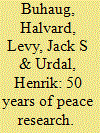

|
|
|
|
|
| Publication |
2014.
|
| Summary/Abstract |
Established in 1964, the Journal of Peace Research (JPR) celebrates 50 years. This anniversary special issue of the journal offers broad reviews of research areas that have been central both to the journal and to the field of peace and conflict research generally. An opening article co-authored by long-time editor Nils Petter Gleditsch offers a historical view on peace research and tracks trends in the use of 'peace' and 'violence' in titles of JPR across the first 49 volumes of the journal. Opening the review article section, two contributions address key thematic areas for the journal. Few if any subjects have attracted more attention in the study of international relations during the second half of JPR's first 50 years than the democratic peace, and in the extension of this subject, the broader debate about the liberal peace. Additional articles review the status and propose future developments in the study of war and its relationship with territory, ethnicity, ideology and natural resources. Another key historical topic associated with the journal concerns the economic cost of military conflict, while more recent research fields covered include terrorism and human rights, topics that have grown to become major JPR niches. Reflecting the methodological contributions by JPR, two articles focus on challenges of contemporary quantitative political analysis and progress in peace and conflict data collection. Finally, this special issue includes a review of research on international mediation in armed conflicts.
|
|
|
|
|
|
|
|
|
|
|
|
|
|
|
|
| 2 |
ID:
096057
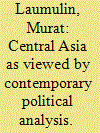

|
|
|
| 3 |
ID:
101190
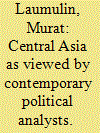

|
|
|
| 4 |
ID:
130445
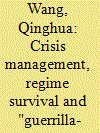

|
|
|
|
|
| Publication |
2014.
|
| Summary/Abstract |
Based on newly available memoirs and previously unexplored policy speeches by insiders, this article conducts a political analysis of the Chinese Communist Party's decision to radically expand college enrollment in June 1999. I argue that the decision exemplifies a "guerrilla-style approach" to policy-making. From late March to early June of 1999 when the radical expansion policy was formulated and legitimated, the top leadership ignored opposition from the Ministry of Education (MOE), overturned established policies and assumed de facto control over MOE bureaucratic power. This abrupt, forceful, disruptive and non-professional policy intervention, which aimed to ensure regime survival in the wake of the Asian financial crisis, was antithetical to regularized educational policy-making in post-Mao China.
|
|
|
|
|
|
|
|
|
|
|
|
|
|
|
|
| 5 |
ID:
139276
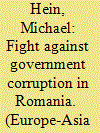

|
|
|
|
|
| Summary/Abstract |
The fight against political, especially government, corruption has dominated Romanian political discourse for many years. However, the vast majority of the political elite have continuously opposed the prosecution and conviction of defendants of corruption crimes. After a long constitutional conflict that seriously inhibited the fight against government corruption between 2006 and 2009, law enforcement agencies finally began to experience some success. Nevertheless, the extent of government corruption has remained consistently high. This article analyses the struggles that have occurred between 2004 and 2013 in the fight against government corruption in Romania and particularly examines the interplay between formal and informal factors in this field.
|
|
|
|
|
|
|
|
|
|
|
|
|
|
|
|
| 6 |
ID:
131328
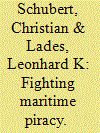

|
|
|
|
|
| Publication |
2014.
|
| Summary/Abstract |
Piracy in international waters is on the rise again, in particular off the coast of Somalia. While the dynamic game between pirates, ship-owners, insurance firms and the military seems to have reached some kind of equilibrium, piracy risks generating significant negative externalities to third parties (e.g. in terms of environmental hazards and terrorism), justifying attempts to contain it. We argue that these attempts may benefit from a look back - through the analytical lens of rational choice theory - to the most successful counterpiracy campaign ever undertaken, namely, the one led by the Roman general Gnaeus Pompeius Magnus (Pompey the Great) in 67 BC.
|
|
|
|
|
|
|
|
|
|
|
|
|
|
|
|
| 7 |
ID:
131515
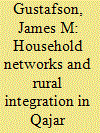

|
|
|
|
|
| Publication |
2014.
|
| Summary/Abstract |
The governorships of Muhammad Isma?il Khan Vakil al-Mulk (1859-68) and Murtaza Quli Khan Vakil al-Mulk II (1868-78) in Qajar Kirman were highlighted by an extensive building campaign which initiated a period of significant social and economic change in the province. This article explores the activities of local elites in managing their family estates in the context of this project through a careful analysis of provincial geographical and historical writings, Persian-language travelogues, and commentary by European administrators and travelers. Kirmani elites began investing in land and commercial agriculture on an unprecedented scale, accelerating Kirman's absorption into global economic patterns as a producer of raw materials like cotton, wool, and opium. An integrated political economy developed regionally through the expanding networks of elite households and their estates, reinforced by families combining landownership with administrative functions in rural areas. This process demonstrates the extent to which Iranians were active participants in transforming their communities in the context of the advance of global capitalism, with longstanding patterns of elite household competition playing an important role in mediating social and political change locally.
|
|
|
|
|
|
|
|
|
|
|
|
|
|
|
|
| 8 |
ID:
127047
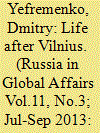

|
|
|
|
|
| Publication |
2013.
|
| Summary/Abstract |
This article presents some of the results of a project conducted as part of a Russian Academy of Sciences program: "Perspectives of Coordinated Social and Economic Development of Russia and Ukraine in the Pan-European Context."
A political anniversary passed largely unnoticed on 12 September 2013: fifty years ago on that date Turkey and the European Economic Community signed an association agreement. Although it might be a good time to look back on what has been achieved since then and make plans for the future, Turkish politicians have largely ignored the anniversary. And for good reason! While the association agreement resulted in tangible economic benefits for Turkey, in the political sense it doomed that ambitious country to 50 years of humiliating uncertainty in the antechamber of a unifying Europe. Today Ukraine, another large country, is impatiently waiting to be let into that antechamber. But no political analyst in his right mind will state that Ukraine will not have to wait longer than Turkey for full-fledged European Union membership.
|
|
|
|
|
|
|
|
|
|
|
|
|
|
|
|
| 9 |
ID:
133587
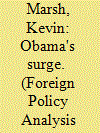

|
|
|
|
|
| Publication |
2014.
|
| Summary/Abstract |
This study examines the decision-making process leading to President Barack Obama's decision to order a troop surge in Afghanistan in December 2009. I analyze the decision-making process according to the precepts of the bureaucratic politics model and conclude that the bureaucratic politics model provides a compelling and descriptively accurate account of the Afghanistan surge decision-making process. Actors' policy preferences were influenced by consideration of bureaucratic role and position within government, significant examples of political activity occurred throughout the strategy review, and the ultimate decision was a political compromise.
|
|
|
|
|
|
|
|
|
|
|
|
|
|
|
|
| 10 |
ID:
125706
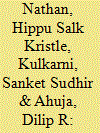

|
|
|
|
|
| Publication |
2013.
|
| Summary/Abstract |
India's energy situation is characterized by increasing energy demand, high fossil fuel dependency, large import shares, and significant portion of population deprived of modern energy services. At this juncture, natural gas, being the cleanest fossil fuel with high efficiency and cost effectiveness, is expected to play an important role. India, with only 0.6% of proven world reserves, is not endowed with adequate natural gas domestically. Nevertheless, there are gas reserves in neighbouring regions which gives rise to the prospects of three cross border gas pipeline projects, namely, Iran-Pakistan-India, Turkmenistan-Afghanistan-Pakistan-India, and Myanmar-Bangladesh-India. This study is a political analysis of these pipeline projects. First, it provides justification on use of natural gas and promotion of cross border energy trade. Then it examines these three pipeline projects and analyses the security concerns, role of different actors, their positions, shifting goals, and strategies. The study develops scenarios on the basis of changing circumstances and discusses some of the pertinent issues like technology options for underground/underwater pipelines and role of private players. It also explores impact of India's broader foreign relations and role of SAARC on the future of pipelines and proposes energy induced mutually assured protection (MAP) as a concept for regional security.
|
|
|
|
|
|
|
|
|
|
|
|
|
|
|
|
| 11 |
ID:
128873
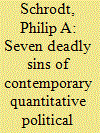

|
|
|
|
|
| Publication |
2014.
|
| Summary/Abstract |
A combination of technological change, methodological drift and a certain degree of intellectual sloth, particularly with respect to philosophy of science, has allowed contemporary quantitative political analysis to accumulate a series of dysfunctional habits that have rendered much of contemporary research more or less meaningless. I identify these 'seven deadly sins' as: Garbage can models that ignore the effects of collinearity; Pre-scientific explanation in the absence of prediction; Excessive reanalysis of a small number of datasets; Using complex methods without understanding the underlying assumptions; Interpreting frequentist statistics as if they were Bayesian; A linear statistical monoculture that fails to consider alternative structures; Confusing statistical controls and experimental controls. The answer to these problems is not to abandon quantitative approaches, but rather engage in solid, thoughtful, original work driven by an appreciation of both theory and data. The article closes with suggestions for changes in current practice that might serve to ameliorate some of these problems.
|
|
|
|
|
|
|
|
|
|
|
|
|
|
|
|
| 12 |
ID:
154100
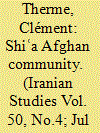

|
|
|
|
|
| Summary/Abstract |
This article aims to present a political analysis of the relationship between the Shiʿa community in Afghanistan and the new political system that emerged after the US military intervention of 2001. In light of the sectarian conflicts in the greater Middle East and the connection between South West Asia and the Syrian war since 2011, this article illustrates the limits of the social empowerment of the Shiʿa communities in Afghanistan. The article outlines the internal religious scene and the connections between āyatollāhs (marājeʿ), mainly from Iran or Iraq, and Afghan Shiʿite believers. It also examines how the Afghan Shiʿite community differs from those of Iran and Iraq.
|
|
|
|
|
|
|
|
|
|
|
|
|
|
|
|
| 13 |
ID:
142549
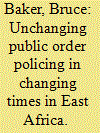

|
|
|
|
|
| Summary/Abstract |
This article offers a political analysis of the practices and motives of public order policing in Ethiopia and Uganda. It offers an explanation of the continuation of forceful tactics against political protest in a context of changing methods of information gathering, organisation and mobilisation by urban activists resulting from their access to internet and communication technology. It finds the two regimes, as anocracies, are caught between legally allowing protest and yet, conscious of their fragility, determined to crush opposition. For the latter approach, their militarist leaderships rely heavily on continued police violence. The paper concludes that failure of the police to adapt their public order policing to the new protest environment leaves them increasingly ineffective and unpopular. It is likely to provoke an escalation of violence and may both undermine the legitimacy of their regimes and reverse their attempts to open political space that justified their rebellions against former autocracies.
|
|
|
|
|
|
|
|
|
|
|
|
|
|
|
|
|
|
|
|
|